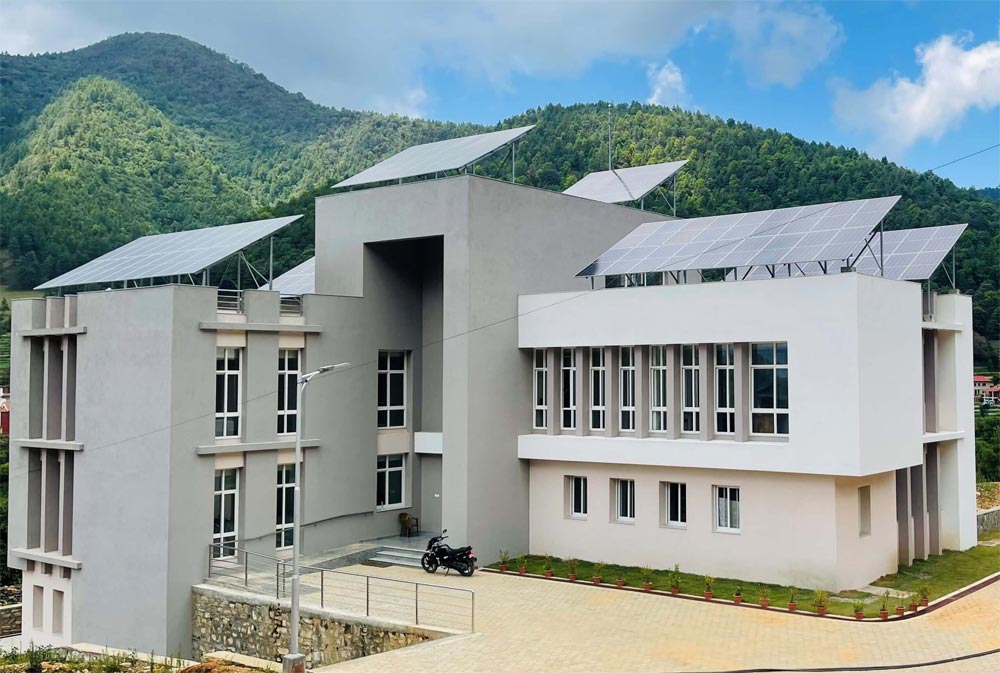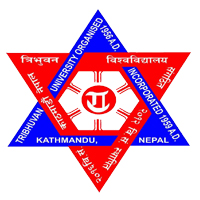Overview
Madan Bhandari University of Science & Technology (MBUST):
Amid the tranquil settings of Chitlang, in the heart of the Makwanpur district, the Madan Bhandari University of Science and Technology (MBUST) emerges as a monumental hub for educational advancement and technological progress. Since its inception in 2019, MBUST has expanded over a sprawling 740 Ropanis, dedicating itself to embody the progressive vision of the esteemed Madan Bhandari, a figure synonymous with leadership and transformation in Nepal.
Crafting a New Era of Research and Development
MBUST's identity as a multi-disciplinary, research-centric university is strategically crafted to bolster Nepal’s technology sector. By synthesizing new knowledge with a robust production of adept human resources, MBUST is pioneering the pathway to extensive Research, Development, and Innovation (RDI).
-Building.jpg)
Strategic Academic Framework
- Project-Based Learning: A progressive approach where students confront real-world challenges, fostering problem-solving skills from the get-go.
- Incubation Center: A crucible for innovation, guiding students from ideation to prototype, empowering the next generation of entrepreneurs.
- Meritocracy in Practice: MBUST pledges an unwavering commitment to integrity and competence, ensuring a merit-based environment free from corruption and discrimination.
Governance and Autonomy:
The forward-thinking MBUST Bill underscores the university’s resolve for institutional autonomy and a departure from conventional educational frameworks. With a BOT (Board of Trustees) at the helm, MBUST assures governance practices that are modern, inclusive, and accountable.
Key Highlights of Institutional Autonomy
- Diverse and Inclusive Leadership: The BOT embraces international expertise, reflecting MBUST’s global outlook.
- Self-governing Faculty Appointments: Ensuring optimal recruitment to foster a culture of excellence.
- Rule-making Authority: The BOT's empowered to legislate frameworks conducive to the university's growth.
Laying the Foundations
The establishment of the MBUST Development Board signifies a concrete step toward materializing this center of excellence. With its sights set on advanced degrees and research initiatives in burgeoning economic sectors, MBUST is charting a course for impactful educational contributions.
Curriculum Development
Focused areas such as Artificial Intelligence, IoT, tourism, and hill economy form the cornerstone of MBUST's curriculum, poised to make tangible impacts on Nepal’s economic landscape.
A Vision of Global Stature
MBUST's aspirations are clear—to evolve into a world-class university that doesn’t just excel in academia, but actively contributes to a prosperous and equitable Nepal. The university's commitment is evident in its drive to attract top-tier talent, both students and staff, creating an environment ripe for cutting-edge research and development to solve the pressing problems of various industry sectors.
Mission:
With a resolute mission to mold graduates into innovators and entrepreneurs—“job creators” not merely “job seekers”—MBUST's educational paradigm is finely tuned to the dynamics of the global job market and the needs of Nepal's economy.
Pioneering Academic Programs
MBUST stands poised to offer specialized programs, all designed with a research-intensive focus that promises to place graduates at the forefront of their fields:
- Artificial Intelligence: Delving into the realm of intelligent systems and machine learning.
- Data Science: Unearthing insights from data to drive decision-making.
- Forest Biomaterials Science and Engineering: Pioneering sustainable materials for the future.
- Organic Agriculture: Advancing sustainable farming practices.
- Tourism Science and Engineering: Elevating Nepal's tourism through scientific innovation and infrastructure development.

Courses Offered:
Ph.D. in Forest Biomaterials Science and Engineering: This rigorous doctoral program is designed for those seeking to delve deep into the science and engineering of forest biomaterials. It's an intersection of biology, chemistry, and material science, aiming to advance knowledge in sustainable materials and their applications.
Master's in Forest Biomaterials Science and Engineering: The master's program builds on the fundamentals of forest biomaterials, preparing graduates to spearhead development in bio-based products and technologies. The curriculum is crafted to blend theoretical knowledge with practical insights.
Ph.D. in Organic Agriculture: This advanced degree is for scholars who want to contribute to the evolution of organic farming practices. Research topics may include sustainable agricultural methods, crop health, soil science, and the economics of organic farming systems.
Master's in Organic Agriculture: The program nurtures future leaders in organic agriculture by offering comprehensive education in organic crop management, certification processes, and the latest developments in the organic sector, bridging the gap between ecological practices and market dynamics.
Master's in Tourism Infrastructure: Understanding the pivotal role of infrastructure in tourism, this master's program focuses on the design, planning, and management of tourism facilities and services. Graduates will be equipped to enhance the tourism landscape while maintaining sustainability and cultural integrity.
Holistic Admission Process
Prospective students of MBUST are assessed holistically, encompassing their academic prowess, research potential, and extracurricular competencies, ensuring a batch of well-rounded, research-driven individuals.
Tentative Qualification Standards
For Ph.D. Programs:
- A Master’s degree in Engineering, Technology, Science, or a related field from a recognized university.
- A minimum Cumulative Grade Point Average (CGPA) as specified in the Call for Applications.
- Completion and submission of a thesis or similar research at the Master’s level.
- A research concept paper aligned with MBUST's themes, spanning 2,000 to 2,500 words.
- Publications in peer-reviewed journals will be considered an added advantage.
- A personal statement of 600 to 700 words outlining the motivation for choosing MBUST.
- Evidence of abilities beyond academics, such as leadership, innovation, or extracurricular achievements, relevant to the success in the program.
For Research Master's Programs:
- A Bachelor's degree of at least four years in science, engineering, technology, or a relevant discipline from well-recognized universities.
- A minimum CGPA as defined in the Call for Applications.
- A research concept paper that adheres to MBUST’s outlined themes, within 1,500 to 2,000 words.
- Preference for candidates with an undergraduate thesis or project report.
- A personal essay of 600 to 700 words expressing the rationale behind applying to MBUST.
- A detailed account of the applicant's skills, including extracurricular engagements that are pertinent to their success in the proposed field of study.
Top Reasons to Choose MBUST
- World-Class Education: Attain unparalleled academic and practical knowledge.
- Innovative Research: Contribute to Nepal's economy through pioneering research.
- Real-world Problem-Solving: Engage with industries to address real-world challenges.
- Expert Guidance: Learn from globally-renowned faculty and industry stalwarts.
- Advanced Facilities: Utilize top-tier research resources for innovative projects.
- Industry Integration: Benefit from internships and collaborations with leading industries.
- Scholarship Opportunities: Avail fee waivers and scholarships for academic excellence.
- Global Network: Build valuable international connections for a global career.
Learn More and Connect
Explore MBUST’s offerings in detail and take the first step towards transforming your academic and professional journey. For comprehensive information and inquiries:
- Visit: https://www.mbust.edu.np
- Contact: info@mbust.edu.np
- Chitlang, Thaha Municipality – 9, Makwanpur, Nepal
- +977-9840088016, +977-9849848053













